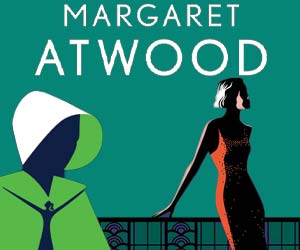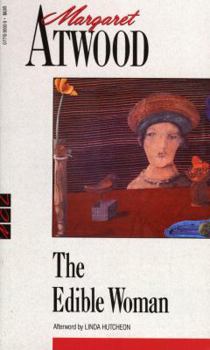The Edible Woman
Select Format
Select Condition 
Book Overview
The novel that put the bestselling author of The Handmaid's Tale and The Testaments on the literary map. The Booker Prize winner's first novel is both a scathingly funny satire of consumerism and a... This description may be from another edition of this product.
Format:Mass Market Paperback
Language:English
ISBN:0771099509
ISBN13:9780771099502
Release Date:August 1989
Publisher:New Canadian Library
Length:320 Pages
Weight:0.41 lbs.
Dimensions:0.7" x 4.3" x 7.0"
Customer Reviews
5 ratings
Fun with the world of metaphor
Published by Thriftbooks.com User , 23 years ago
I've got a few Atwood books and this is by far the oldest one, so if it's not her writing debut (as opposed to poetry, which I think she did as well) it's pretty close and I have to say that I was pretty impressed with how strong her narrative voice was and how confident the book feels. Reading it you get a sense that the author knows exactly what she's doing and how to go about it. That sense makes the book that much more fun to read, even if it's not going to be recognized as one of her absolute masterpieces. The story concerns a woman named Marian, presumably in her mid-twenties, who after getting engaged starts to lose her desire to eat most kinds of food. But even that description is a tad misleading because the eating aspect doesn't even come into play until almost halfway through the book. Indeed those looking for a feminist version of "Thinner" should probably go the other way right now. Instead it's an examination of a woman's role in both society and marriage and that gives the story more weight, balancing the often silly and humorous situations Marian finds herself in. It's definitely the lightest book I've read by Atwood, it's hard to believe this is the same woman who did the ultra-depressing Life Before Man. But the main focus isn't even on Marian's quasi-eating disorder but on her interactions with her fiancee, her roommate (the subplot with her wanting a baby is absolutely hilarious in a darkly absurd way) and an odd graduate student she meets while out doing a survey for her job. That graduate student and his monologues was my favorite part of the chapter and probably represents Atwood's poke at the academic world, but definitely shows off her gift for words. But be on the look out for metaphors, just about everything means something else it seems, even the switch from first to third person struck me as odd until I realized even that represented something. In the end the metaphors get stretched a bit too far and the only truly silly moment is right at the end. But it's immensely enjoyable for an Atwood novel and one of the few that you'll find yourself laughing more than feeling glad you aren't the characters.
Actually very good
Published by Thriftbooks.com User , 23 years ago
I thought I had lost my faith in 20th century writing, but this novel proved just how well a feminist can write. The book isn't even preachy, in fact, it reminds me of a story by Charlotte Gilman Perkins called "The Yellow Wallpaper". It's almost like both characters are literally being eaten, or consumed, by male driven society. Rich in metaphors, the novel illustrates how women can regain control of their lives, not necessarily through the bounds of matrimony, but through the rejection of it. Marian does not seem to have a life her own, but follows paths shaped by other's expectations of her as a woman. I really enjoyed the end of the book, it seemed fitting and makes the book a whole metaphor for the moral crisis that Marian goes through, particularly when her mind is rebelling from the society that influences her daily life. In other words, read this book.
The Edible Woman was delicious!
Published by Thriftbooks.com User , 25 years ago
The best feature of this book is its ability to enthrall. Clearly, Margaret Atwood's style in this novel is still green, as she wrote this book when she was only about 24, but I think that it contributed to my enjoyment of this book. While it is slightly reminiscent of some of her later fiction, it differs significantly in the narrational flow, allowing the reader to be gently assimilated into the message of the book without feeling as if he or she should always be "on the lookout" for pithy hidden messages. Some may claim that this book is superficial and a run-of-the-mill attempt at distinctive women's lib literature, but this is not so. It is simply subtle insight into human nature in all aspects--including the aspects of both women AND men. Also be reminded that Atwood actually wrote the book before the brunt of the women's lib movement, but unfortunately, it was not published until 1970, marking it as correlative to the movement. I highly recommend this book, especially, in fact, for those who are dissatisfied with Atwood's prose style and writing techniques. Perhaps this book will equalize your perception of her. Although I enjoy Atwood across the board, this book is one of the most refreshing and engrossing reads I've encountered.
Refreshingly Real
Published by Thriftbooks.com User , 25 years ago
This is only the third Margaret Atwood novel I have read--having picked them all up at various flea markets and discount stores on a whim. I am a woman who usually does not identify with female authors, most of whom seem too aware of being "female authors" to tell a straightforward story without feminist propaganda. _The Edible Woman_, however, really hit me on a visceral level. Marian is the same age as I and has a similar perspective. She has a kitchen sink with molding dishes and a refrigerator whose innards seem to be growing. She has a college education and a job that she has no emotional attachement to, in fact she is horrified when forced to sign on to a retirement package, feeling tied to forever to an apathetic existence. She occasionally feels invisible when in a room with others, particularly it seems around her fiancee, at one point sliding between a bed and a wall while her friends quaff gin and play with camera equipment, never noticing she is gone until she is squashed under the bed as one of them sits down. She seems to be wandering through life without a purpose and clings onto the idea of being a wife by becoming almost accidentally engaged to an "ideal" man. Soon after this she finds herself slowly being nauseated by different sorts of food.If the young ladies in this book didn't dress up so much and drink alcohol and smoke while pregnant it would seem very much a generation X novel! Starring apathetic protagonists Marian and Duncan, who both manage to be vivid characters in spite of the fact that they seem to spend most of their time just floating through life. A large part of the novel's strength is its well rounded secondary characters from Ainsley, Marian's single connivingly procreating room-mate, to Clara a somewhat disgruntled mother, to Duncan's slightly deranged grad-school room-mates. This was a very fun book filled with characters I can imagine meeting among my own group of friends.
Atwood's best book
Published by Thriftbooks.com User , 25 years ago
Margaret Atwood always depicts fascinating, well-rounded women, but Marian and company are the best of the bunch. Each is torn in a different direction by her female identity and ideas of her obligation to normalcy. Marian plans to marry but shows no real enthusiasm for the idea and begins to disappear as the engagement continues. Ainsley is determined to bear a child to fulfil her biological destiny, but sees men purely as a means to an end. Clara, married and a mother, is bewildered and somewhat disgusted at having three children and appears to Marian as a queen termite figure, giving birth over and over. The book is full of deliciously mean humor as the women wander baffled through the stages of traditional womanhood and attempt to save their senses of self on the way.
The Edible Woman Mentions in Our Blog

Happy Birthday to the Marvelous Margaret Atwood
Published by Ashly Moore Sheldon • November 18, 2020
Margaret Atwood is 81 years old today! The renowned Canadian author has been publishing poetry, novels, nonfiction, children’s books, and more since 1961, but her star just keeps on rising. Known largely for books like The Handmaid’s Tale, you may be surprised to learn that speculative fiction actually represents a small fraction of the versatile author’s work.






